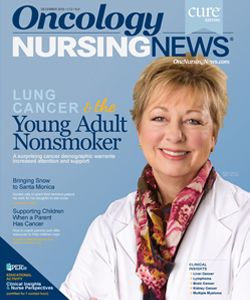Do the Write Thing
Oncology nurses want to read news and research written by other nurses.
Lisa Schulmeister, MN, RN, FAAN

Lisa Schulmeister, MN, RN, FAAN
Ever have that moment when you need concise, nurs­ing-focused information about a new drug or complex treatment protocol, but it doesn’t exist? Find it chal­lenging to keep up with guideline updates? Wonder how other facilities address nursing issues such as determining staffing needs, assessing clinical competency, and evalu­ating medical surveillance programs for staff who admin­ister hazardous drugs? If so, you are not alone; it’s very likely that if you have a need for information on a certain topic, so do other nurses.
It can also be daunting when an online query regarding a new treatment regimen brings several thousand search results. We now have information at our fingertips at the point of care, but who has time to sort through the massive amount of information that now exists? More impor­tantly, much of this information may not be relevant to nursing practice.
So, what can be done to address the need for concise, nursing-focused information that optimizes care for people with cancer? The answer, of course, is content written for and by oncology nurses.
Before you assemble that list of reasons someone else and not you should be writing for publication, consider the following: Who better to write about pressing nursing issues than those experiencing them? Who better to identify the gaps in the published literature?
Publishing opportunities for nurses are more expansive than ever. In addition to traditional journal articles and text­book chapters, there are newer ways of disseminating infor­mation, such as online articles, blogs, vlogs, and study guides. Listservs and online message boards such as the Oncology Nursing Society’s Member Community are also options. Important information can sometimes be conveyed to nurse colleagues in just a few paragraphs or bullet points—it is a myth that a published work has to be long form.
Many available resources can guide nurses through the writing process. The website Nurse Author & Editor (naepub.com) archives articles on specific aspects of writing and provides links to publishing opportunities for nurses. Writing mentorship programs, such as the one offered by the Clinical Journal of Oncology Nursing, connect experi­enced nurse authors with new writers.
Writing mentors can be helpful allies not only in getting started with writing but also in staying focused and meeting timelines. Seek out mentors at your facility or in your local nursing program. Many faculty members are expected to collaborate with clinicians on writing for publication. Or consider collaborating with an interprofessional author­ship group. Adding the perspective of a pharmacist or social worker, for instance, can enhance content.
What should you write about? Start by jotting down topics that you would like to know more about or need to know more about, such as the latest cancer screening guidelines. Ask your nursing colleagues about which topics they would like more information. Read nursing journals and attend journal club meetings (or start a club) to discuss research study findings and clinical articles. Information already in print can trigger additional questions or ideas for topics. For example, if study data support the effectiveness of a new treatment regimen, there are a host of possibilities for subse­quent articles, such as on dosing considerations, how to best administer the treatment, and managing adverse events.
How to get started? Create an outline, list how your article fills the gaps identified in another article, jot down ideas as they come to you, focus on a specific topic, review research findings and identify nursing implications, or present a case study of an interesting patient. Get started writing. Don’t obsess over the perfect first sentence; often, the first sentence is one of the last things that experienced nurse authors write.
Keep writing. All too often, what could have been an important and urgently needed article ends up abandoned in a computer file or desk drawer. It takes time, but writing can be accomplished in short spurts as well as dedicated blocks of time. It may be helpful to set goals, such as writing for 30 minutes every day or 2 hours each week. Don’t get bogged down in how the information is presented—just get it down on paper or on your computer screen. It’s easy to rearrange information, expand or delete sections, and write an introduction and summary once you have the raw material. Sometimes it becomes apparent that there is so much information that more than 1 publication is needed to cover the chosen topic. This is a good thing, because the best way to become an experienced nurse author is to keep publishing!
The November 2018 issue of Seminars in Oncology Nursing is a one-stop resource for learning about publishing in oncology nursing. It includes articles on searching for oncol­ogy-related information, identifying topics, converting school papers to publishable articles, authorship considerations, and tips on writing journal articles and book chapters.
Have a tip for your colleagues about writing for nurse publications? Share it on social media, and tag with #OncNurseConnect!

Innovative Program Reduces Nurse Turnover and Fosters Development
Published: September 12th 2024 | Updated: September 12th 2024The US Oncology Network (The Network) has developed one of the most comprehensive programs in the nation to support the professional development and retention of new oncology nurses.



